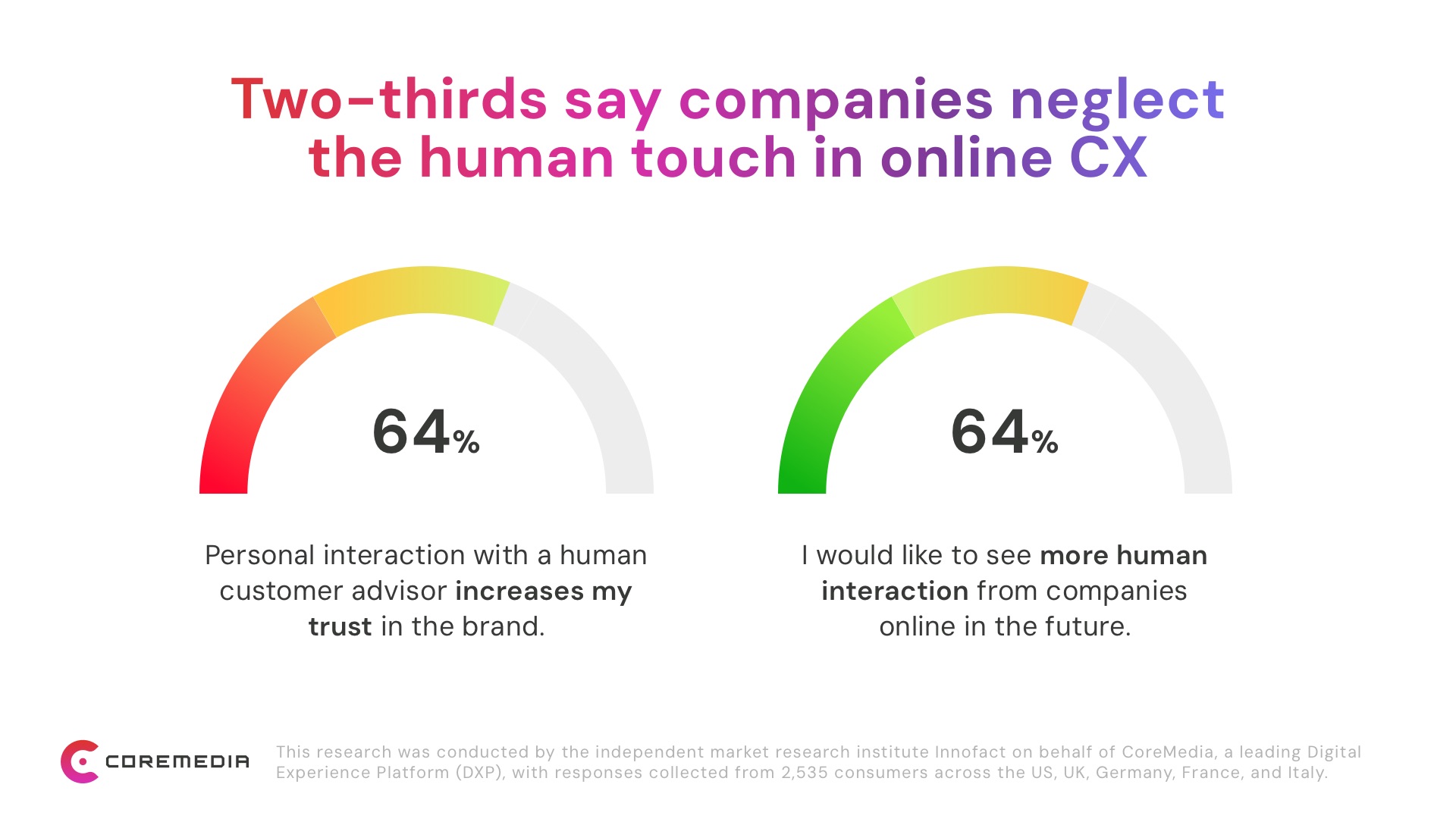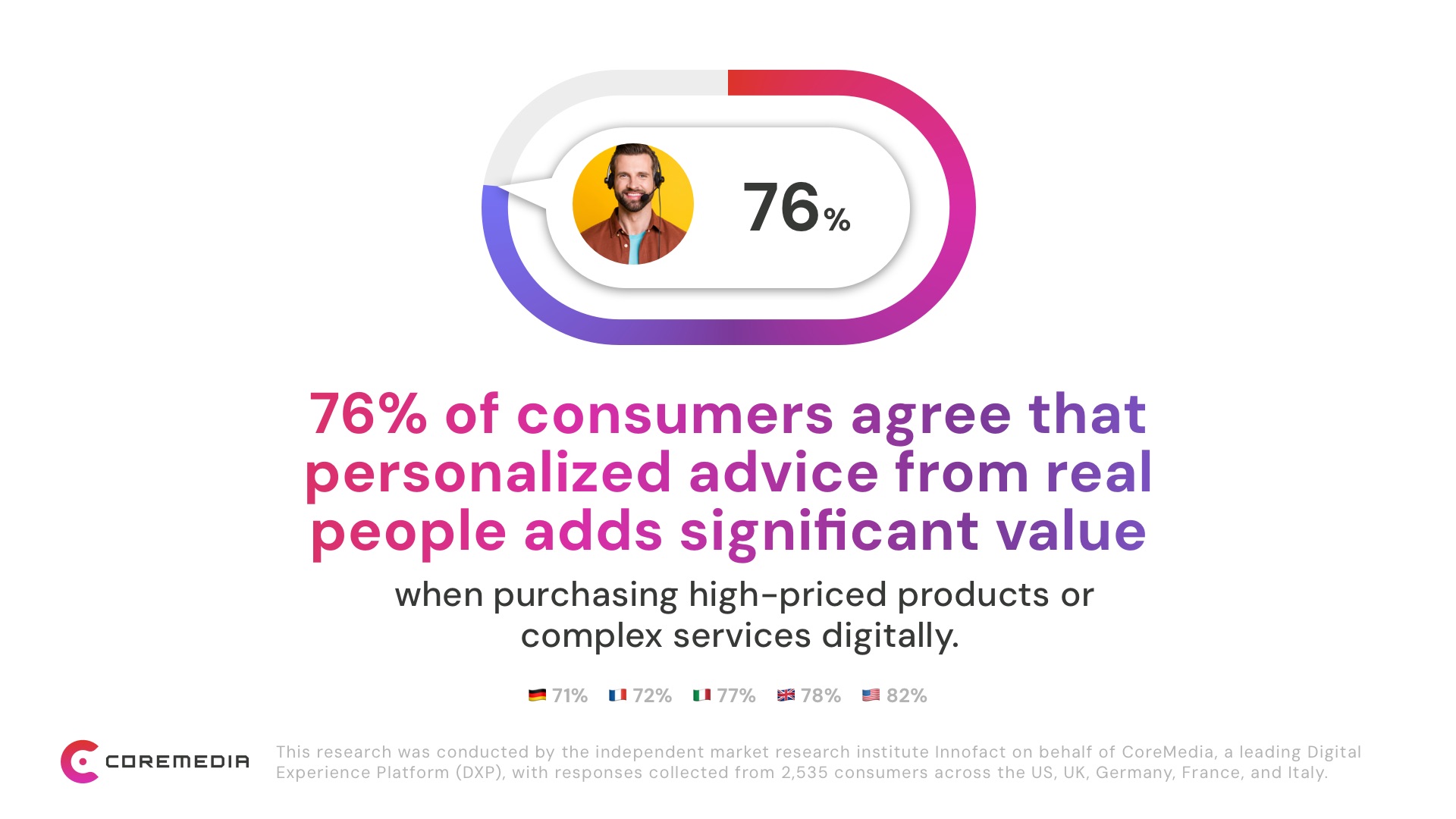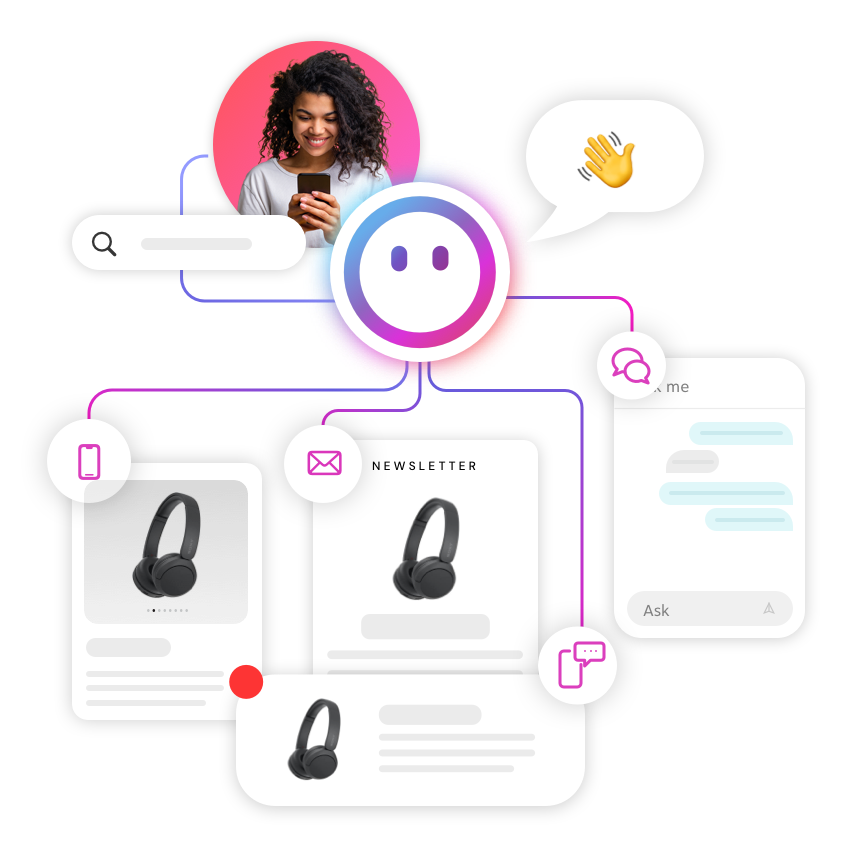Customer experience has been a top priority for most companies in recent years simply because it drives results. In a world where digital interactions are everywhere, it’s no doubt that tools like chatbots, online booking systems and self-service product configurators help consumers get answers and make decisions faster, all on their own.
But something seems off. While these tools are very convenient, they often feel cold and automated, missing the warmth and empathy that human interaction can offer. That’s why the “human touch” is now seen as a real differentiator that customers seek, and what allows companies to build a true omnichannel customer-centric experience. It’s a luxury that helps brands stand out and build closer connections. So, where does the sweet spot lie?
For businesses, mixing the efficiency of AI-driven automation with real, human interactions is turning out to be a great way to meet different customer needs. Finding the right balance between these two approaches is key to creating a customer experience that doesn’t just get the job done but also builds trust, loyalty and meaningful relationships.
AI, self-service and automation are effective but limited
Online self-service tools, like chatbots, social messaging product configurators and interactive voice response (IVR), have become indispensable. They provide a 24/7 support layer that simplifies everything from finding the perfect product to checking order status to resolving common technical issues. Automated chatbots, in particular, are ideal for handling high volumes of repetitive inquiries and can deliver answers instantly. This approach not only saves time for customers but also allows businesses to operate efficiently by reallocating human resources to more complex tasks or interactions that require empathy or personal attention.
A study by the market research institute Innofact, conducted on behalf of CoreMedia, found that 64% of consumers feel that the human element of online customer experiences is often overlooked by businesses. Additionally, 75% expressed a desire for human support when automated personalization tools reach their limitations. So, it’s safe to state that a simple human recommendation can reinforce a customer’s confidence in their purchase, fostering trust and satisfaction.

Human interaction: Can we call it a competitive advantage?
To stand out, brands are bringing the human touch back into customer journeys, especially in moments where empathy, a deeper explanation and a tailored approach really matter. Live chat, phone support and video calls with real people allow businesses to give customers a more individualized experience, adapting to each person’s needs.
The value of human support becomes even more apparent when dealing with high-stakes purchases, like luxury items or complex services, like insurance policies and financial products. In fact, 69% of customers acknowledge the added benefit of receiving personal advice from real people when purchasing high-priced items or concluding contracts. When customers are committing to significant purchases or navigating complex options, they often have detailed questions or feel uncertain. A human advisor provides the reassurance, clarity and empathy needed to build confidence and trust in the brand.
For example, consider a customer shopping for a car or evaluating an insurance plan. While they may start the journey with self-service tools to explore options, their final decision might rely on a conversation with a brand advisor who can address specific questions and offer insights based on the customer’s unique needs. Sören Stamer, CEO of CoreMedia, highlights the importance of this human element, emphasizing that while automation efficiently handles routine tasks, human support can deliver the personalized experiences that foster loyal long-term relationships.
One of the most critical aspects human advisors bring to customer interactions is empathy and authenticity — qualities that 75% of customers prioritize in their experiences. In fact, 64% of consumers want to see more human interaction from companies online. At the same time, as brands increasingly adopt AI, nearly three-quarters of customers express concern about the potential for unethical use of the technology. Unlike AI, which follows set scripts and data patterns, human advisors can genuinely listen, pick up on emotional cues and tailor their responses to each customer’s unique needs. This personal approach builds trust, alleviates doubts, and helps customers feel truly understood rather than merely processed.
The emotional connection provided by human advisors can be powerful in driving customer loyalty. Studies show that customers are more likely to come back to a brand and recommend it to others when they’ve experienced personalized, empathetic support. And while AI is great for speed and convenience, its true power comes when combining it with genuine human interactions that leave a lasting impact.

The best of both worlds: Combining AI efficiency with human engagement
We can safely say that the ideal customer experience doesn’t rely entirely on either automation or human support, but instead blends the two and their respective strengths. AI and self-service tools can handle repetitive tasks, transforming how businesses operate and freeing human agents to concentrate on more complex or sensitive customer issues. Additionally, AI can help prioritize interactions from high-value customers, ensuring that the most valuable clients are promptly attended to by human agents for a more personalized experience.
In this hybrid model, AI manages the initial stages of a customer interaction, offering quick solutions for common questions and allowing customers to access information at their convenience. Then, for situations requiring deeper engagement, customers are offered the option to get human support at the click of a button. Offering specific segments to connect with an adviser via live chat, call or video call not only optimizes resource allocation but also ensures that each customer receives the right level of care based on their specific needs. By adopting AI in customer service – e.g. by providing agents with real-time insights on customer behavior, mood analysis and response suggestions - agents can respond faster and with greater personalization to any request.
More and more brands are adopting this model, making it easy for customers to access live support through phone, video channels, or human-operated chats. High-end retailers, telcos and banks, for example, are now empowering customers to connect with advisors with just one click. This flexible approach caters to different customer needs, enhancing the experience for those looking for more guidance before making a decision. For instance, CoreMedia’s customer MásMóvil increased conversions by up to 20% by consolidating its data, gaining control over calls, and implementing channels like click-to-call.

Preparing for the future of ROI-driven customer experience
Even the best customer experiences of today won’t pass the bar in just a few years. As customer expectations keep evolving, brands need to find ways to blend the efficiency of automation with the warmth of human support. By combining AI with human interactions, companies can go beyond simply meeting basic needs to create truly memorable experiences that make them stand out and drive customer satisfaction and loyalty.
So, the human touch in CX isn’t just a nice-to-have anymore, but a strategic advantage. With digital solutions everywhere, human support helps brands differentiate, build trust and strengthen relationships. As businesses continue fine-tuning their strategies, the value of genuine human connection will only increase, solidifying the human touch as a key player in any successful CX approach.
We can help you boost customer satisfaction and loyalty by integrating this vital element into your customer experience strategy. Let’s talk!








